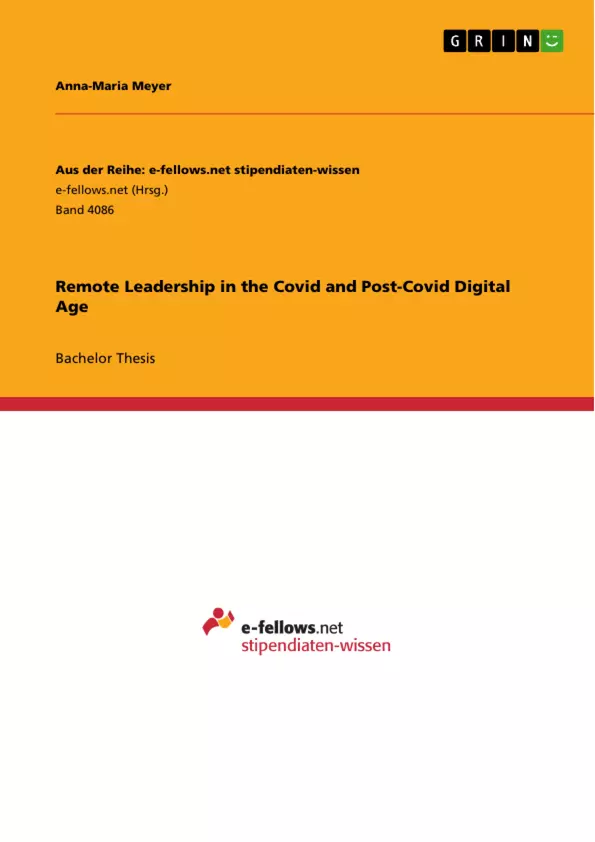This thesis provides some best practices and other principles to help overcome the challenges and disruption of the Covid-19 pandemic.
This thesis discusses these eleven best practices and other principles in the later chapters, and will help leaders realize possible challenges and how to overcome them. If teams fail to overcome them and adjust to the virtual environment, they will not be able to work effectively any more and could cause potential damage and losses to the organization by not completing their tasks and goals. These practical implications can help leaders and remote teams adjust to a virtual environment and are why this thesis is very relevant during the Covid-19 pandemic and also post-pandemic, as these are helpful guidelines for remote leaders.
Essential principles for remote leadership are the following in no particular order:
• Provision of technology
• Frequent and well communication
• Sequencing of tasks
• Provision of emotional and social support.
• Maintenance of productivity and engagement
• Promotion of a work-life balance
• Acquisition of mentoring quality
• Reinforcement of trustworthiness
• Encouragement of shared leadership
• Establishment of norms
• Digital leadership
Covid-19 has disrupted many workplaces, changed the working environment, and shifted most workplaces to a remote work setting, meaning most people had to start working from home. As the Covid-19 pandemic was rapidly advancing, working from the office was no longer possible in most workplaces. Many companies implemented a 'new normal' in the form of virtual teams and remote work. With this disruption and change, many difficulties and issues arose. Virtual teams and, therefore, also remote leadership face different challenges than face-to-face leadership and teams do. These new challenges came quickly and somewhat unexpectedly, and now leaders and organizations have to face them. Coping with these challenges is crucial for the Covid-19 era and post-pandemic age, when workspaces will most likely stay remote to some extent. Therefore, this topic is significant in the present and will also remain important for the future.
Inhaltsverzeichnis (Table of Contents)
- Introduction
- Relevance of the Research Topic
- Research Objective
- Structure of this thesis
- Review of Academic Literature
- Literature on Digital Leadership
- Literature on Remote Work
- Review of Managerial Literature
- Literature on Remote Work During Covid-19
- Literature on Leadership during Covid-19
- Challenges of Remote Work
- Issues and Difficulties in Leading People Digitally
- The Influence of Covid-19 on Leadership
- Recommendations for Remote Work
- Responding to Challenges of Remote Work and Digital Leadership
- Principles for Remote Leadership
- Hands-On Ideas for Successful Digital Leadership
- Conclusion
- Theoretical Conclusion
- Managerial Conclusion
- Summary
Zielsetzung und Themenschwerpunkte (Objectives and Key Themes)
This thesis aims to explore the challenges and opportunities of remote leadership in the digital age, particularly in the context of the Covid-19 pandemic. It delves into existing literature on digital leadership, remote work, and leadership during crisis situations to understand the unique demands of remote work settings.
- The impact of Covid-19 on the shift to remote work
- Challenges of remote leadership in comparison to traditional leadership styles
- Essential principles for successful remote leadership
- Practical strategies and ideas for effective digital leadership
- The long-term implications of remote work for organizations and leadership
Zusammenfassung der Kapitel (Chapter Summaries)
The introductory chapter establishes the relevance of the research topic by highlighting the significant shift to remote work during the Covid-19 pandemic. It then outlines the research objective and the structure of the thesis.
Chapters 2 and 3 conduct a thorough review of existing academic and managerial literature on digital leadership, remote work, and leadership during crisis situations. These chapters identify key concepts, theories, and frameworks related to the topic.
Chapter 4 focuses on the challenges of remote work, exploring specific issues and difficulties that leaders face when leading teams remotely. The chapter also examines the influence of the Covid-19 pandemic on leadership styles and practices.
Chapter 5 offers recommendations for effective remote work by presenting practical strategies and principles for successful digital leadership. It also explores hands-on ideas for navigating the challenges of remote leadership in the digital age.
Schlüsselwörter (Keywords)
This thesis focuses on key concepts such as remote leadership, digital leadership, remote work, virtual teams, Covid-19, leadership during crisis, and digital transformation. The analysis draws upon both academic and managerial perspectives to provide a comprehensive understanding of the challenges and opportunities presented by the shift to remote work.
Frequently Asked Questions
What are the main challenges of remote leadership?
Key challenges include maintaining communication, ensuring trust without physical presence, promoting work-life balance, and providing emotional support digitally.
How did Covid-19 impact leadership styles?
The pandemic forced a rapid shift to virtual teams, requiring leaders to adapt to digital tools and focus more on "shared leadership" and social-emotional support.
What is "Digital Leadership"?
It refers to leading teams using digital technologies, focusing on agility, tech-provision, and fostering a digital-first culture within the organization.
Why is work-life balance critical in remote work?
Without a physical office, the boundaries between work and private life blur, leading to potential burnout if leaders do not actively promote healthy boundaries.
What are best practices for virtual team engagement?
Best practices include frequent communication, establishing clear norms, sequencing tasks effectively, and using technology to maintain social bonds.
- Citar trabajo
- Anna-Maria Meyer (Autor), 2021, Remote Leadership in the Covid and Post-Covid Digital Age, Múnich, GRIN Verlag, https://www.grin.com/document/1167116



